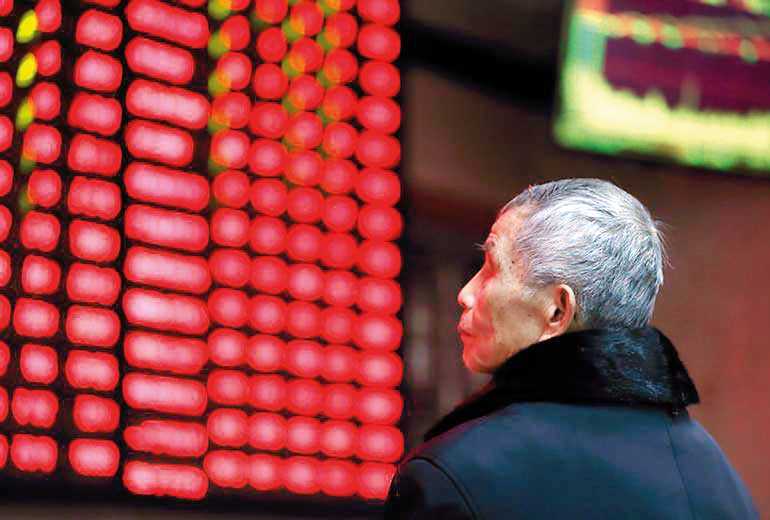Tuesday Feb 24, 2026
Tuesday Feb 24, 2026
Tuesday, 12 November 2019 00:00 - - {{hitsCtrl.values.hits}}

A man looks on in front of an electronic board showing stock information at a brokerage house in Nanjing, Jiangsu province, China 13 February – Reuters
SYDNEY (Reuters): Asian shares sank on Monday, the safe haven yen rose and gold jumped following a fresh escalation of violence in Hong Kong while uncertainty still remained over whether the United States and China could end their damaging trade war.
Hong Kong’s Hang Seng index .HSI led the losses in Asia, down 2.4%, after police fired live rounds at protestors on the eastern side of Hong Kong island. Cable TV and other Hong Kong media reported at least one protester being wounded. Video footage showed a protester lying in a pool of blood.
In an indication of weak start on Wall Street E-minis for the S&P500 eased 0.3%. US bond markets are closed on Monday, but currency and equity markets will open.
In early European trades, the pan-region Euro Stoxx 50 futures were flat, German DAX futures were down 0.1% while London’s FTSE futures were off slightly.
MSCI’s broadest index of Asia-Pacific shares outside Japan retreated 1% from a six-month high to be on track for its biggest daily percentage loss since late August.
Chinese shares faltered with the blue-chip CSI300 index .CSI300 down 1.3%. Japan’s Nikkei gave up early gains to drift away from a recent 13-month high after data showed the country’s core machinery orders fell for a third straight month.
Australian shares bucked the downbeat trend, rising 0.7% to a near three-week high. “The China-US trade war and the Hong Kong protest are combining to cast a negative pall on Asian markets today,” said James McGlew, analyst at stockbroking firm Argonaut.
“Hong Kong protests have been dragging on for a while and the view from the financial world is that it’s really starting to bite now. The further this drags on it’s certainly going to be very negative.”
Gold, which rises during times of uncertainty, rebounded from a three-month low touched on Friday to be last up 0.3% at $1,462.11 an ounce. In currencies, the Japanese yen gained on the dollar to 109 while the Australian dollar, a liquid gauge for risk, was off slightly at $0.6856.
The dollar index was a touch softer at 98.301 while the euro ticked up to $1.1024.
Trade war
Market attention was also on the US-China trade talks. US President Donald Trump told reporters on Saturday that talks with China had moved more slowly than he would have liked, but added that Beijing wanted a deal more than he did.
That was a more upbeat tone than just a few days earlier when he had stressed that the White House would not agree to a full rollback of existing tariffs, remarks that hit stock prices and the dollar.
“Despite his bluster that ‘China wants a trade deal more than I do’, markets sense that Trump is likely quite keen to call a truce on what is becoming a serious US economic risk heading into the 2020 election year,” said David Bassanese, Sydney-based economist at Betashares.
By the close of Wall Street on Friday, optimism had returned to the market as investors bet that Washington needs a deal and it is in the interest of China, too. All three major US indexes eked out record closing highs.
Analysts said the outlook for equities was highly dependent on US economic data as a US-China trade agreement would help bolster manufacturing and industrial sectors.
Data on October US industrial production and retail sales, along with the National Federation of Independent Business’s monthly small business survey, are scheduled for release this week.
In commodities, benchmark Brent crude fell 51 cents to $62.00 a barrel while West Texas Intermediate (WTI) crude slipped 46 cents to $56.78 a
barrel.